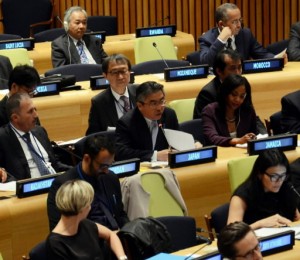China and South Korea oppose Japan’s request to “visit A-bombed cities” at NPT committee meeting
May 26, 2015
by Michiko Tanaka, Staff Writer
New York--On May 18, Committee I (Disarmament) of the Review Conference of the Nuclear Non-proliferation Treaty (NPT), taking place at United Nations headquarters in New York, discussed a revised draft of the meeting’s final document. Shinsuke Sugiyama, the deputy minister for Foreign Affairs, urgently dispatched from Japan, demanded that wording which requested that world leaders visit the A-bombed cities of Hiroshima and Nagasaki be restored to the document. At China’s insistence, this text had been removed from the first draft. However, along with China, South Korea expressed opposition to this wording, and the discussion ended without the participants being able to bridge their divide.
Mr. Sugiyama stressed the importance of including this text in the final document, saying, “In order to raise awareness of the inhumane nature of nuclear weapons, the most effective way would be for world leaders to visit the A-bombed cities. If they visit these cities, they will understand the need to accelerate nuclear disarmament.” Such countries as Australia, the Philippines, and the Marshall Islands expressed support for Japan’s position.
But China was vehement in its opposition, contending that Japan is seeking to “distort” history and that its request, which amounts to taking advantage of this issue for such ends, is unacceptable. South Korea, too, expressed a dim view of Japan’s proposal and said that its request has no immediate connection to enhancing the NPT regime.
Meanwhile, discussions over the inhumanity of nuclear weapons, the central focus of the conference, have devolved as well. While non-nuclear nations are eyeing the start of negotiations for a legal framework to create a nuclear weapons convention, the nuclear powers insist on a “step by step” approach toward nuclear disarmament, thus producing an impasse.
Discussions at Committee I, Main Committee II (Non-proliferation), and Main Committee III (Peaceful use of nuclear energy) ended without reaching unanimous agreement on the text of the final document. They will report on these developments at the general meeting scheduled for May 19. After that, the final document will be compiled by Taous Feroukhi, the chair of the Review Conference, and others.
(Originally published on May 20, 2015)
New York--On May 18, Committee I (Disarmament) of the Review Conference of the Nuclear Non-proliferation Treaty (NPT), taking place at United Nations headquarters in New York, discussed a revised draft of the meeting’s final document. Shinsuke Sugiyama, the deputy minister for Foreign Affairs, urgently dispatched from Japan, demanded that wording which requested that world leaders visit the A-bombed cities of Hiroshima and Nagasaki be restored to the document. At China’s insistence, this text had been removed from the first draft. However, along with China, South Korea expressed opposition to this wording, and the discussion ended without the participants being able to bridge their divide.
Mr. Sugiyama stressed the importance of including this text in the final document, saying, “In order to raise awareness of the inhumane nature of nuclear weapons, the most effective way would be for world leaders to visit the A-bombed cities. If they visit these cities, they will understand the need to accelerate nuclear disarmament.” Such countries as Australia, the Philippines, and the Marshall Islands expressed support for Japan’s position.
But China was vehement in its opposition, contending that Japan is seeking to “distort” history and that its request, which amounts to taking advantage of this issue for such ends, is unacceptable. South Korea, too, expressed a dim view of Japan’s proposal and said that its request has no immediate connection to enhancing the NPT regime.
Meanwhile, discussions over the inhumanity of nuclear weapons, the central focus of the conference, have devolved as well. While non-nuclear nations are eyeing the start of negotiations for a legal framework to create a nuclear weapons convention, the nuclear powers insist on a “step by step” approach toward nuclear disarmament, thus producing an impasse.
Discussions at Committee I, Main Committee II (Non-proliferation), and Main Committee III (Peaceful use of nuclear energy) ended without reaching unanimous agreement on the text of the final document. They will report on these developments at the general meeting scheduled for May 19. After that, the final document will be compiled by Taous Feroukhi, the chair of the Review Conference, and others.
(Originally published on May 20, 2015)








